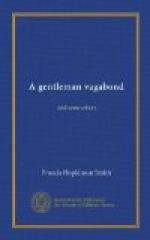In summer mornings Jonathan made an alarm clock of this plank, flopping it about with the end of a fishing-rod poked up from below, never stopping until he saw my sleepy face peering down into his own. There was no bureau, only a nail or so in the scantling, and no washstand, of course; the tin basin at the well outside was better.
Then there was an old wife that lived in the cabin,—an old wife made of sole leather, with yellow-white hair and a thin, pinched face and a body all angles,—chest, arms, everywhere,—outlined through her straight up and down calico dress. When she spoke, however, you stopped to listen,—it was like a wood sound, low and far away,—soft as a bird call. People living alone in the forests often have these voices.
Last there was a dog,—a mean, sniveling, stump-tailed dog, of no particular breed or kidney. One of those dogs whose ancestry went to the bad many generations before he was born. A dog part fox,—he got all his slyness here; and part wolf, this made him ravenous; and part bull-terrier, this made him ill-tempered; and all the rest poodle, that made him too lazy to move.
The wife knew this dog, and hung the bacon on a high nail out of his reach, and covered with a big dish the pies cooling on the bench; and the neighbors down the road knew him and chased him out of their dairy-cellars when he nosed into the milk-pans and cheese-pots; and even the little children found out what a coward he was, and sent him howling home to his hole under the porch, where he grumbled and pouted all day like a spoiled child that had been half whipped. Everybody knew him, and everybody despised him for a low-down, thieving, lazy cur,—everybody except Jonathan. Jonathan loved him,—loved his weepy, smeary eyes, and his rough, black hair, and his fat round body, short stumpy legs, and shorter stumpy tail,—especially the tail. Everything else that the dog lacked could be traced back to the peccadillos of his ancestors,—Jonathan was responsible for the tail.
“Ketched in a b’ar-trap I hed sot up back in thet green timber on Loon Pond Maountin’ six year ago last fall, when he wuz a pup,” he would say, holding the dog in his lap,—his favorite seat. “I swan, ef it warn’t too bad! Thinks I, when I sot it, I’ll tell the leetle cuss whar it wuz; then—I must hev forgot it. It warn’t a week afore he wuz runnin’ a rabbet and run right into it. Wall, sir, them iron jaws took thet tail er his’n off julluk a knife. He’s allus been kinder sore ag’in me sence, and I dunno but he’s right, fur it wuz mighty keerless in me. Wall, sir, he come yowlin’ hum, and when he see me he did look saour,—no use talkin’,—jest ez ef he wuz a-sayin’, ‘Yer think you’re paowerful cunnin’ with yer b’ar-traps, don’t ye? Jest see what it’s done to my tail. It’s kinder sp’ilt me for a dog.’ All my fault, warn’t it, George?” patting his head. (Only Jonathan would call a dog George.)
Here the dog would look up out of one eye as he spoke,—he hadn’t forgotten the bear-trap, and never intended to let Jonathan forget it either. Then Jonathan would admire ruefully the end of the stump, stroking the dog all the while with his big, hairy, paddle-like hands, George rooting his head under the flap of the party-colored waistcoat.




